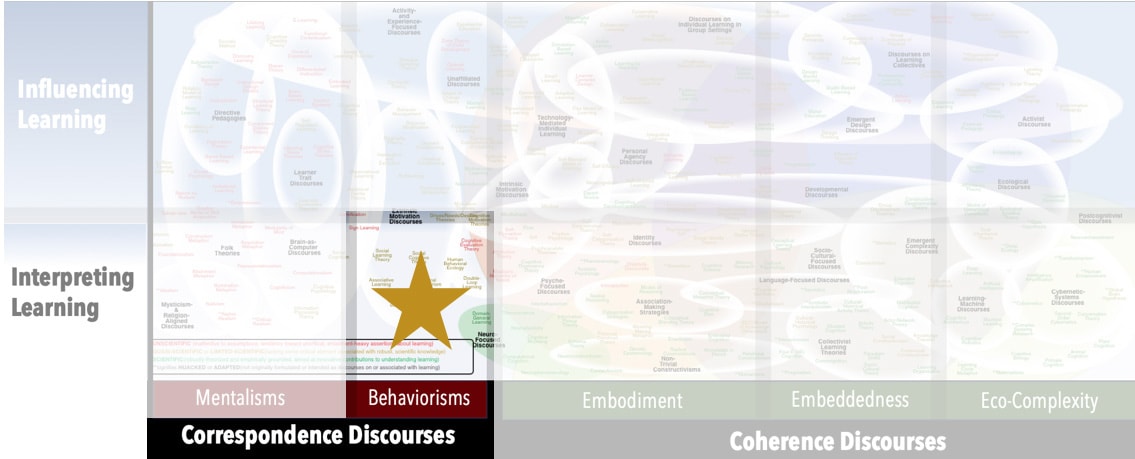Focus
The mental activity associated with observable cause–effect, stimulus–response eventsPrincipal Metaphors
- Knowledge is … one’s repertoire of behaviors
- Knowing is … behaving (triggered by stimuli)
- Learner is … an organism
- Learning is … changes in behavior (linking stimuli to responses)
- Teaching is … training; engineering behavior (through deliberate conditioning)
Originated
1940sSynopsis
Methodological Behaviorism is among the earliest and most prescriptive Behaviorisms. Developed in the early 20th century, it expanded on Classical Conditioning’s emphasis on observing and measuring physical cause and effect. However, unlike Radical Behaviorism, which avoided any consideration of internal mental function, Methodological Behaviorism permitted hypothesizing about cognitive processes as the cause of behaviors. (To be clear, it embraced empirical, observation-based research methods and rejected introspective methods which focused on mental activity.) Discourses associated with Methodological Behaviorism include:- Learning Set (Set Learning) (Harry Harlow, 1940s) – the learning of complicated, multi-step behavior in a single trial. Learning Sets are posited to be hypothesis-driven (i.e., involving thought) rather than trial-based (i.e., processes of Associative Learning).
- Rational Behaviorism (Duane Rumbaugh, 1990s) – Grounded in observations of complex ape behaviors that cannot be satisfactorily explained with principles of Associative Learning, Rational Behaviorism includes the possibility of emergent, thought-based learning alongside processes of Classical Conditioning and Operant Conditioning.
- Salience Theory (Duane M. Rumbaugh, 2000s) – Most Behaviorisms assume that organisms’ behaviors are reactions to events/stimuli in their environments. Salience Theory ascribes more active agency to organisms. It asserts that organisms/learners are continuously scanning their worlds for stimuli that are salient to their existences – that is, they are actors, not just reactors. Associated constructs include:
- Motivational Salience (Kent Berridge, 1990s) – the extent to which specific cues are attractive or attention-grabbing due to the dopamine system’s activation. Motivational Salience is associated with one’s prioritizing of those cues or their related rewards. Subcomponents of Motivational Salience are identified as:
- Incentive Salience – those instances of Motivational Salience associated with positive stimuli and/or outcomes (see Reinforcing Stimulus, under Operant Conditioning)
- Aversive Salience – those instances of Motivational Salience associated with undersireable stimuli and/or outcomes (see Punishment, under Operant Conditioning)
- Salience (Saliency) – the property of something perceived that makes it stand out (i.e., more obvious, or more emotionally impactful) to the perceiver. Subconstructs include:
- Salience Bias (Perceptual Salience) – a Cognitive Bias that determines the Salience of a stimulus (e.g., an object, event, or information) for a specific perceiver
- Motivational Salience (Kent Berridge, 1990s) – the extent to which specific cues are attractive or attention-grabbing due to the dopamine system’s activation. Motivational Salience is associated with one’s prioritizing of those cues or their related rewards. Subcomponents of Motivational Salience are identified as:
- Selective Learning – the ability to choose a specific stimulus or item, based on relative value to the learner, when several possibilities are present. Selective Learning is seen to involve prior learning, biological preparedness, and/or situational considerations.
Commentary
See Behaviorisms. In addition to those limitations, proponents of Radical Behaviorism regarded Methodological Behaviorism as self-limiting because it allowed consideration of unobservable, unmeasurable mental activity.Authors and/or Prominent Influences
Ivan Pavlov; John B. WatsonStatus as a Theory of Learning
Methodological Behaviorism is a theory of learning, with significant contributions to academic understandings of learning. Demonstrated insights include the knowers are coupled to their contexts, that humans have many types of motivation, and that personal insight is more about “knowing” (dynamic, idiosyncratic, context-dependent) than “knowledge” (fixed, universal, context-independent).Status as a Theory of Teaching
With the assumption of cause–effect relationships between stimuli and responses, Methodological Behaviorism presented immediate prescriptions for how to prompt learners to manifest or suppress particular behaviors. Consequently, although explicitly about learning, Methodological Behaviorism was quickly embraced as a theory of teaching, rising to some dominance among researchers and policy makers by the mid-1900s. Even though it has been shown to be inadequate for making sense of the complexity of human learning, it continues to have a strong presence in curriculum documents, classroom practices, and evaluation schemes.Status as a Scientific Theory
With regard to methodology, like most Behaviorisms, Methodological Behaviorism meets the requirements of a scientific inquiry. However, it falls short on matters of critical attentiveness to its central constructs – a point that is evident in its inability to account for phenomena such as human creativity. A further instance is a general inattentiveness to some inherited assumptions about learning and learners.Subdiscourses:
- Aversive Salience
- Incentive Salience
- Learning Set (Set Learning)
- Motivational Salience
- Rational Behaviorism
- Salience (Saliency)
- Salience Bias (Perceptual Salience)
- Salience Theory
- Selective Learning
Map Location

Please cite this article as:
Davis, B., & Francis, K. (2024). “Methodological Behaviorism” in Discourses on Learning in Education. https://learningdiscourses.com.
⇦ Back to Map
⇦ Back to List
